人教版(2019)高中英语选择性必修第三册 Unit1 Art 单元语法详解课件(共24张PPT)
文档属性
| 名称 | 人教版(2019)高中英语选择性必修第三册 Unit1 Art 单元语法详解课件(共24张PPT) |
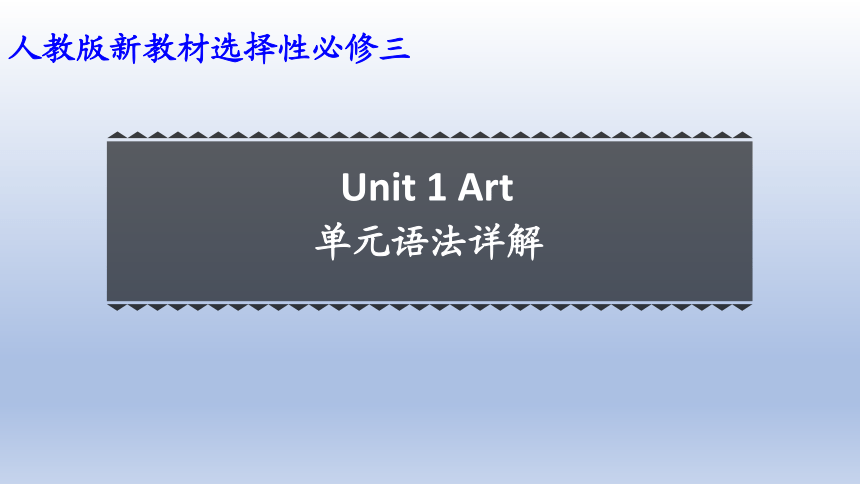
|
|
| 格式 | pptx | ||
| 文件大小 | 1.3MB | ||
| 资源类型 | 教案 | ||
| 版本资源 | 人教版(2019) | ||
| 科目 | 英语 | ||
| 更新时间 | 2023-03-12 20:49:36 | ||
图片预览


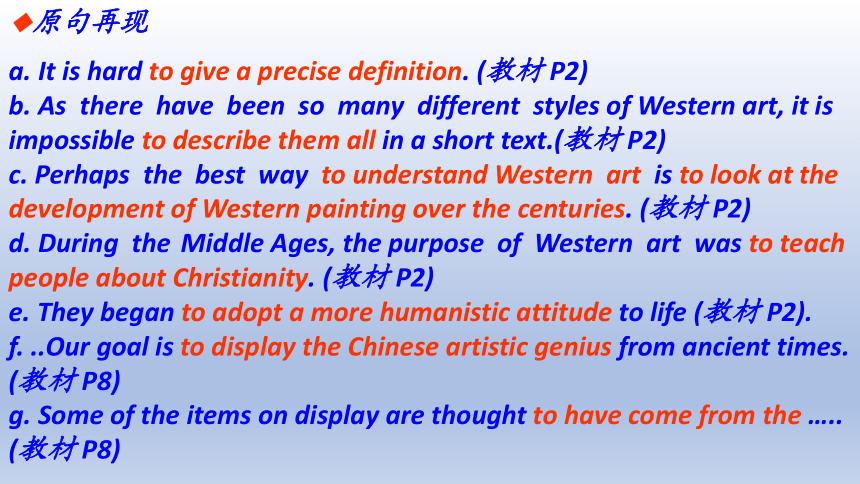
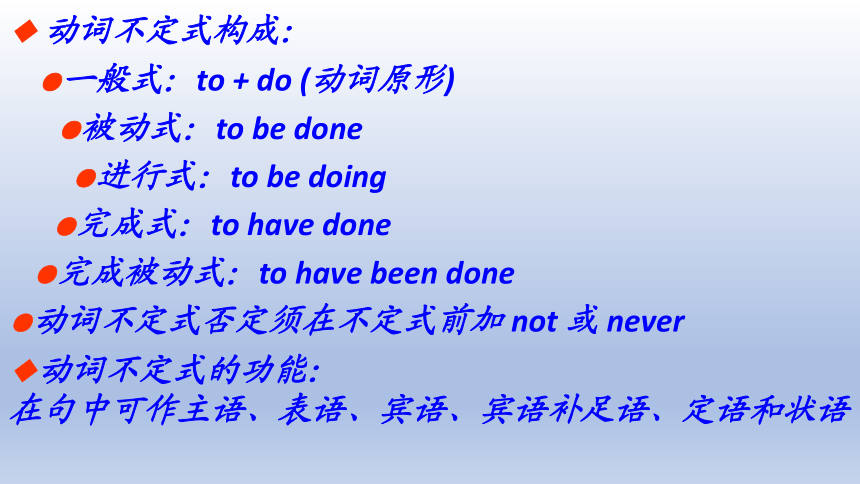
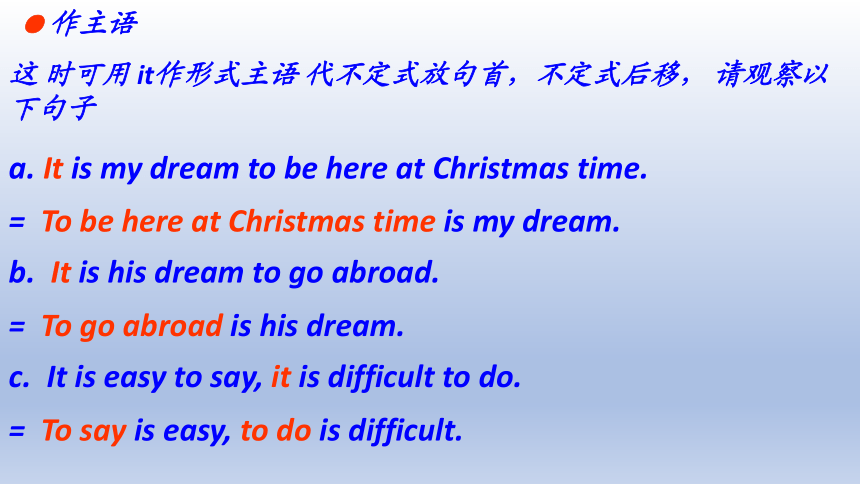
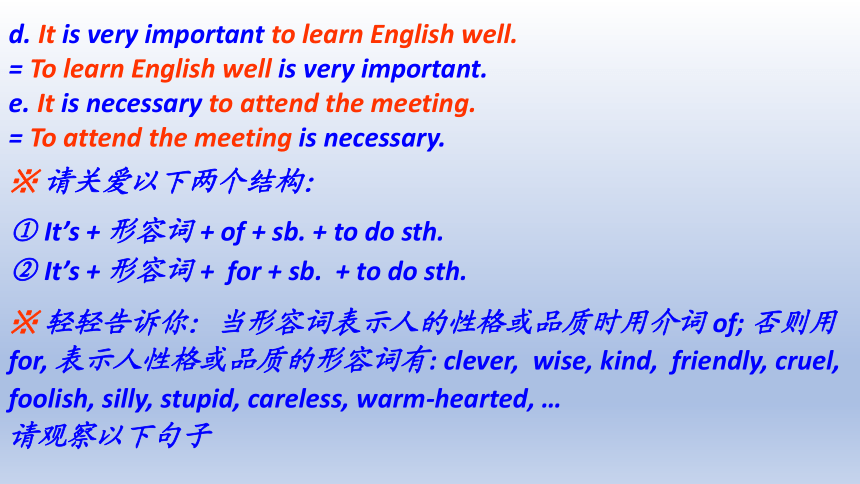
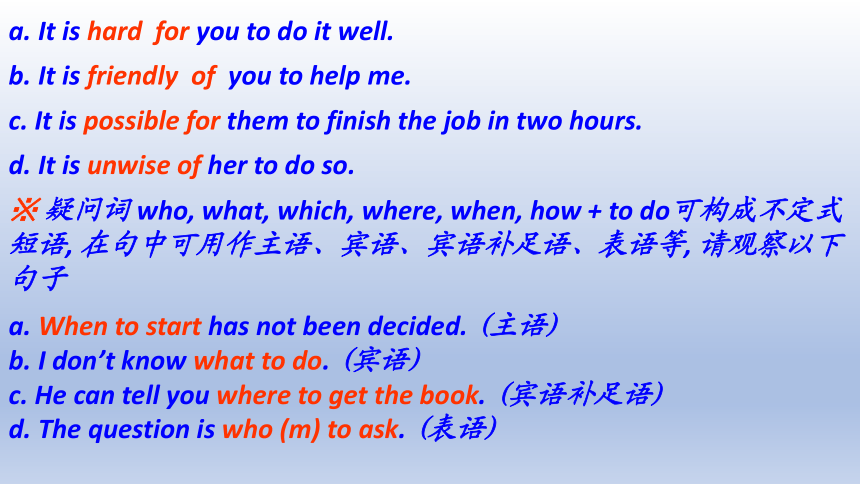
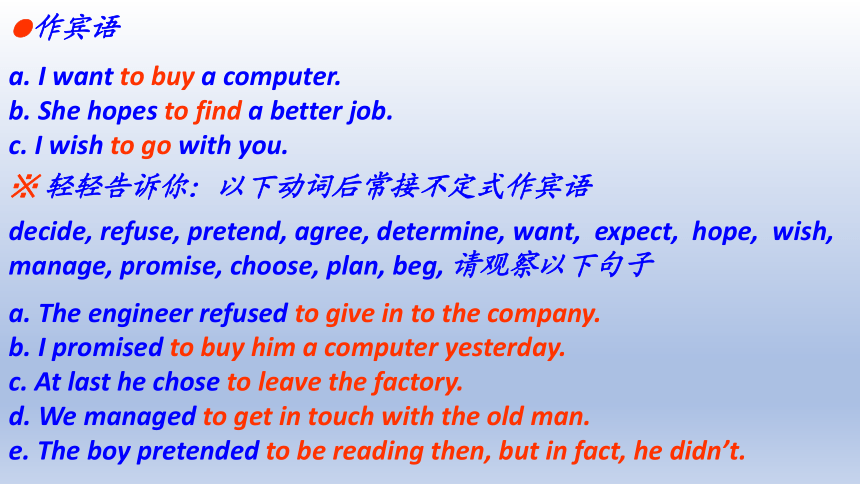
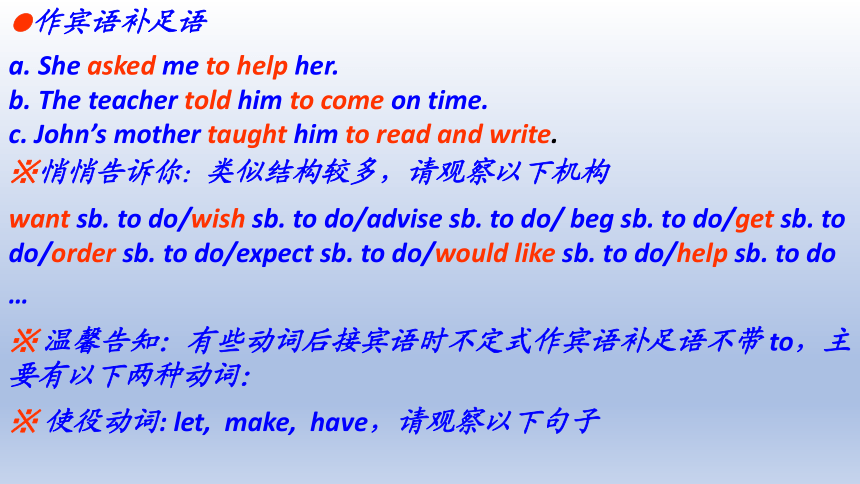
文档简介
(共24张PPT)
Unit 1 Art
单元语法详解
人教版新教材选择性必修三
本单元重点语法
动词不定式
◆原句再现
a. It is hard to give a precise definition. (教材 P2)
b. As there have been so many different styles of Western art, it is impossible to describe them all in a short text.(教材 P2)
c. Perhaps the best way to understand Western art is to look at the development of Western painting over the centuries. (教材 P2)
d. During the Middle Ages, the purpose of Western art was to teach people about Christianity. (教材 P2)
e. They began to adopt a more humanistic attitude to life (教材 P2).
f. ..Our goal is to display the Chinese artistic genius from ancient times. (教材 P8)
g. Some of the items on display are thought to have come from the …..
(教材 P8)
◆ 动词不定式构成:
●一般式:to + do (动词原形)
●被动式:to be done
●进行式:to be doing
●完成式:to have done
●完成被动式:to have been done
●动词不定式否定须在不定式前加 not 或 never
◆动词不定式的功能:
在句中可作主语、表语、宾语、宾语补足语、定语和状语
● 作主语
这 时可用 it作形式主语 代不定式放句首,不定式后移, 请观察以下句子
a. It is my dream to be here at Christmas time.
b. It is his dream to go abroad.
c. It is easy to say, it is difficult to do.
= To be here at Christmas time is my dream.
= To go abroad is his dream.
= To say is easy, to do is difficult.
d. It is very important to learn English well.
= To learn English well is very important.
e. It is necessary to attend the meeting.
= To attend the meeting is necessary.
※ 请关爱以下两个结构:
① It’s + 形容词 + of + sb. + to do sth.
② It’s + 形容词 + for + sb. + to do sth.
※ 轻轻告诉你:当形容词表示人的性格或品质时用介词 of; 否则用 for, 表示人性格或品质的形容词有: clever, wise, kind, friendly, cruel, foolish, silly, stupid, careless, warm-hearted, …
请观察以下句子
a. It is hard for you to do it well.
b. It is friendly of you to help me.
c. It is possible for them to finish the job in two hours.
d. It is unwise of her to do so.
※ 疑问词 who, what, which, where, when, how + to do可构成不定式短语, 在句中可用作主语、宾语、宾语补足语、表语等, 请观察以下句子
a. When to start has not been decided. (主语)
b. I don’t know what to do. (宾语)
c. He can tell you where to get the book. (宾语补足语)
d. The question is who (m) to ask. (表语)
●作宾语
a. I want to buy a computer.
b. She hopes to find a better job.
c. I wish to go with you.
※ 轻轻告诉你:以下动词后常接不定式作宾语
decide, refuse, pretend, agree, determine, want, expect, hope, wish,
manage, promise, choose, plan, beg, 请观察以下句子
a. The engineer refused to give in to the company.
b. I promised to buy him a computer yesterday.
c. At last he chose to leave the factory.
d. We managed to get in touch with the old man.
e. The boy pretended to be reading then, but in fact, he didn’t.
●作宾语补足语
a. She asked me to help her.
b. The teacher told him to come on time.
c. John’s mother taught him to read and write.
※悄悄告诉你:类似结构较多,请观察以下机构
want sb. to do/wish sb. to do/advise sb. to do/ beg sb. to do/get sb. to do/order sb. to do/expect sb. to do/would like sb. to do/help sb. to do
…
※ 温馨告知:有些动词后接宾语时不定式作宾语补足语不带 to,主要有以下两种动词:
※ 使役动词: let, make, have,请观察以下句子
a. The teacher made/had our monitor clean the blackboard.
b. Please let me do the job.
※感官动词: see, watch, hear, feel, listen to, notice, observe, look at等,请观察以下句子
a. I saw them play on the playground at that time.
b. My father noticed the little boy enter the cave.
※轻轻告诉你:这些感官动词接宾语后,宾语补足语也可以是现在分词或过去分词,但意义完全不一样,请观察以下句子
a. I heard her sing in the next room.
我听见她在隔壁唱歌了(唱歌的动作已经发生过了)
b. I heard her singing in the next room then.
当时,我听见她正在隔壁唱歌(唱歌的动作正在发生)
c. He felt his arm touched suddenly.
他感觉到他的胳膊突然被碰了一下(表示被动)
d. I saw him come into the classroom.
我看见他走进了教室(动作已经发生且为主动)
e. I saw him coming into the classroom.
我看见他正走进教室(动作正在发生)
f. I saw him beaten.
我看见他挨打了 (表示被动)
●试试看
a. I often see him dance on a small square.
→ He is often seen _____________ on a small square.
b. We heard the lady sing in the park just now.
→ The lady was heard _____________ in the park just now.
c. The boss made them work day and night.
→ They were made _______________ day and night.
to dance
to sing
to work
※ 从以上试题可以看出:当使役动词和感官动词接宾语和不带 to 动词不定式作宾语补足语时,如果把句子变为被动语态,原来不带 to的动词不定式需要加上 to. 即:sb. + be done + to do sth.
●作状语
a. He came to show me his new CD player. (表示目的)
b. I went there to see my teacher. (表示目的)
c. She came back to get her English book. (表示目的)
d. The boy was too frightened to move. (表示结果)
※ 动词不定式作目的状语时, to do 可以换成 so as to do/in order to do, 但是,so as to do 不能位于句首, 请观察以下句子
To improve English, she works harder than ever.
= In order to improve English, she works harder than ever. (这里不能换成 so as to improve…)
= She works harder than ever in order to/ so as to /to improve English.
●作表语
a. His work is to feed the animals.
b. Our plan is to help the children in the poor areas.
c. My wish is to be a scientist.
d. His dream is to go to a famous university.
e. The writer’s aim is to write two books in a year.
●作定语(这时不定式与被修饰词有动宾关系,若是不及物动词,介
词不能省略)
a. Give me something to drink.
b. They have much food to eat.
c. He asked for a room to live in. (这里 in 不能少)
d. The ice is hard enough to skate on. (这里 on 不能少)
1. Our headmaster often told us ______ things for granted.
not to have B. not to take
C. didn’t take D. not to make
2. The boy wanted to ride his bicycle in the street, but his
mother told him _____.
A. not to B. not to do C. not do it D. do not to
3. Mrs. Smith warned her daughter _______ after drinking.
never to drive B. to never drive
C. never driving D. never drive
4. The patient was warned _______ oily food after the operation.
to eat not B. eating not C. not to eat D. not eating
◆ 考点训练
B
A
A
C
5. The workers want us ________ together with them.
A. work B. working C. to work D. worked
6. They would not allow him __________ across the enemy line.
A. to risk going B. risking to go
C. for risk to go D. risk going
7. I saw him _______ out of the room.
A. go B. had gone C. has gone D. goes
8. I’ve heard him _______ about you often.
A. spoke B. speaks C. speak D. spoken
9. He doesn’t have to be made _______. He always works hard.
A. learn B. to learn C. learned D. learning
C
A
A
C
B
10. Though he had often made his little sister _____, today he was
made _____ by his little sister.
cry;to cry B. crying;crying
C. cry;cry D. to cry;cry
11. She couldn’t decide which restaurant _______.
A. to have lunch B. to eat
C. to eat at D. eating at
12. There isn’t any difference between the two. I really don’t know
______.
A. where to choose B. which to choose
C. to choose what D. to choose which
A
c
B
13. “ Have you decided when ____ ” “ Yes, tonight.”
A. to leave B. to be leaving
C. will you leave D. are you leaving
14. Last summer I took a course on ________.
A. how to make dresses B. how dresses be made
C. how to be made dresses D. how to be made
15. He doesn’t know ______ to stay or not.
A. whether B. if C. either D. if he will
16. She pretended ______ me when I passed by.
A. not to see B. not seeing
C. to not see D. having not seen
A
A
A
A
17. -- The light in the office is still on. -- Oh, I forgot _____.
A. turning it off B. turn it off
C. to turn it off D. having turned it off
18. Little Jim should love _____ to the theatre this evening.
A. to be taken B. to take C. being taken D. taking
19. Go on ____ the other exercise after you have finished this one.
A. to do B. doing C. with D. to be doing
20. I would love _____ to the party last night but I had to work extra
hours to finish a report.
A. to go B. to have gone C. going D. having gone
21. She reached the top of the hill and stopped _______ on a big rock
nearby.
A. to have rested B. resting C. to rest D. rest
C
A
A
B
C
22. Tom kept quiet about the accident ______ lose his job.
A. so not as to B. so as not to
C. so as to not D. not so as to
23. I need a day or two ________.
A. to think it over B. to think over it
C. thinking it D. thought it over
24. He was too excited _________.
A. speak B. to speak C. not to speak D. speaking
25. Charles Babbage is generally considered _____ the first computer.
A. to invent B. inventing
C. to have invented D. having invented
26. He said he would rather not _______ it right now.
A. doing B. to do C. do D. to be doing
B
A
B
C
C
27. Rather than ____ on a crowded bus, he always prefer ___ a bicycle.
ride;ride B. riding;ride
C. ride;to ride D. to ride;riding
28. It’s freezing outside. You _______ put on your overcoat.
had better to B. had better
C. would better D. would better to
29. The chair looks rather hard, but in fact it is soft to _____.
A. sit B. sit on C. be sit D. be sat on
30. I’m hungry. Get me something _________.
A. eat B. to eat C. eating D. for eating
31. -- I usually go there by train.
-- Why not _____ by boat for a change
A. to try going B. trying to go C. to try and go D. try going
C
B
B
B
D
32. She did nothing _______ at the photo.
except look B. but to look
C. except to look D. but looking
33. I asked him to _______ me a few minutes so that we could go over
all the problems.
A. spend B. spare C. save D. share
34. They won’t let their teacher _______ in that way.
to be treated B. being treated
C. treated D. be treated
35. The problem ______at tomorrow’s meeting is a very difficult one.
being discussed B. discussed
C. to be discussed D. to discuss
A
B
D
C
36. He reached the station _______ only ________ that the
train had just left.
A. tired;learned B. tiring;learning
C. to tire;to learn D. tired;to learn
37. I’m sorry I forgot _______ your dictionary. Let’s borrow
one from Li Ming.
A. to take B. taking C. to bring D. bringing
D
C
That’s all!
Thank you!
Unit 1 Art
单元语法详解
人教版新教材选择性必修三
本单元重点语法
动词不定式
◆原句再现
a. It is hard to give a precise definition. (教材 P2)
b. As there have been so many different styles of Western art, it is impossible to describe them all in a short text.(教材 P2)
c. Perhaps the best way to understand Western art is to look at the development of Western painting over the centuries. (教材 P2)
d. During the Middle Ages, the purpose of Western art was to teach people about Christianity. (教材 P2)
e. They began to adopt a more humanistic attitude to life (教材 P2).
f. ..Our goal is to display the Chinese artistic genius from ancient times. (教材 P8)
g. Some of the items on display are thought to have come from the …..
(教材 P8)
◆ 动词不定式构成:
●一般式:to + do (动词原形)
●被动式:to be done
●进行式:to be doing
●完成式:to have done
●完成被动式:to have been done
●动词不定式否定须在不定式前加 not 或 never
◆动词不定式的功能:
在句中可作主语、表语、宾语、宾语补足语、定语和状语
● 作主语
这 时可用 it作形式主语 代不定式放句首,不定式后移, 请观察以下句子
a. It is my dream to be here at Christmas time.
b. It is his dream to go abroad.
c. It is easy to say, it is difficult to do.
= To be here at Christmas time is my dream.
= To go abroad is his dream.
= To say is easy, to do is difficult.
d. It is very important to learn English well.
= To learn English well is very important.
e. It is necessary to attend the meeting.
= To attend the meeting is necessary.
※ 请关爱以下两个结构:
① It’s + 形容词 + of + sb. + to do sth.
② It’s + 形容词 + for + sb. + to do sth.
※ 轻轻告诉你:当形容词表示人的性格或品质时用介词 of; 否则用 for, 表示人性格或品质的形容词有: clever, wise, kind, friendly, cruel, foolish, silly, stupid, careless, warm-hearted, …
请观察以下句子
a. It is hard for you to do it well.
b. It is friendly of you to help me.
c. It is possible for them to finish the job in two hours.
d. It is unwise of her to do so.
※ 疑问词 who, what, which, where, when, how + to do可构成不定式短语, 在句中可用作主语、宾语、宾语补足语、表语等, 请观察以下句子
a. When to start has not been decided. (主语)
b. I don’t know what to do. (宾语)
c. He can tell you where to get the book. (宾语补足语)
d. The question is who (m) to ask. (表语)
●作宾语
a. I want to buy a computer.
b. She hopes to find a better job.
c. I wish to go with you.
※ 轻轻告诉你:以下动词后常接不定式作宾语
decide, refuse, pretend, agree, determine, want, expect, hope, wish,
manage, promise, choose, plan, beg, 请观察以下句子
a. The engineer refused to give in to the company.
b. I promised to buy him a computer yesterday.
c. At last he chose to leave the factory.
d. We managed to get in touch with the old man.
e. The boy pretended to be reading then, but in fact, he didn’t.
●作宾语补足语
a. She asked me to help her.
b. The teacher told him to come on time.
c. John’s mother taught him to read and write.
※悄悄告诉你:类似结构较多,请观察以下机构
want sb. to do/wish sb. to do/advise sb. to do/ beg sb. to do/get sb. to do/order sb. to do/expect sb. to do/would like sb. to do/help sb. to do
…
※ 温馨告知:有些动词后接宾语时不定式作宾语补足语不带 to,主要有以下两种动词:
※ 使役动词: let, make, have,请观察以下句子
a. The teacher made/had our monitor clean the blackboard.
b. Please let me do the job.
※感官动词: see, watch, hear, feel, listen to, notice, observe, look at等,请观察以下句子
a. I saw them play on the playground at that time.
b. My father noticed the little boy enter the cave.
※轻轻告诉你:这些感官动词接宾语后,宾语补足语也可以是现在分词或过去分词,但意义完全不一样,请观察以下句子
a. I heard her sing in the next room.
我听见她在隔壁唱歌了(唱歌的动作已经发生过了)
b. I heard her singing in the next room then.
当时,我听见她正在隔壁唱歌(唱歌的动作正在发生)
c. He felt his arm touched suddenly.
他感觉到他的胳膊突然被碰了一下(表示被动)
d. I saw him come into the classroom.
我看见他走进了教室(动作已经发生且为主动)
e. I saw him coming into the classroom.
我看见他正走进教室(动作正在发生)
f. I saw him beaten.
我看见他挨打了 (表示被动)
●试试看
a. I often see him dance on a small square.
→ He is often seen _____________ on a small square.
b. We heard the lady sing in the park just now.
→ The lady was heard _____________ in the park just now.
c. The boss made them work day and night.
→ They were made _______________ day and night.
to dance
to sing
to work
※ 从以上试题可以看出:当使役动词和感官动词接宾语和不带 to 动词不定式作宾语补足语时,如果把句子变为被动语态,原来不带 to的动词不定式需要加上 to. 即:sb. + be done + to do sth.
●作状语
a. He came to show me his new CD player. (表示目的)
b. I went there to see my teacher. (表示目的)
c. She came back to get her English book. (表示目的)
d. The boy was too frightened to move. (表示结果)
※ 动词不定式作目的状语时, to do 可以换成 so as to do/in order to do, 但是,so as to do 不能位于句首, 请观察以下句子
To improve English, she works harder than ever.
= In order to improve English, she works harder than ever. (这里不能换成 so as to improve…)
= She works harder than ever in order to/ so as to /to improve English.
●作表语
a. His work is to feed the animals.
b. Our plan is to help the children in the poor areas.
c. My wish is to be a scientist.
d. His dream is to go to a famous university.
e. The writer’s aim is to write two books in a year.
●作定语(这时不定式与被修饰词有动宾关系,若是不及物动词,介
词不能省略)
a. Give me something to drink.
b. They have much food to eat.
c. He asked for a room to live in. (这里 in 不能少)
d. The ice is hard enough to skate on. (这里 on 不能少)
1. Our headmaster often told us ______ things for granted.
not to have B. not to take
C. didn’t take D. not to make
2. The boy wanted to ride his bicycle in the street, but his
mother told him _____.
A. not to B. not to do C. not do it D. do not to
3. Mrs. Smith warned her daughter _______ after drinking.
never to drive B. to never drive
C. never driving D. never drive
4. The patient was warned _______ oily food after the operation.
to eat not B. eating not C. not to eat D. not eating
◆ 考点训练
B
A
A
C
5. The workers want us ________ together with them.
A. work B. working C. to work D. worked
6. They would not allow him __________ across the enemy line.
A. to risk going B. risking to go
C. for risk to go D. risk going
7. I saw him _______ out of the room.
A. go B. had gone C. has gone D. goes
8. I’ve heard him _______ about you often.
A. spoke B. speaks C. speak D. spoken
9. He doesn’t have to be made _______. He always works hard.
A. learn B. to learn C. learned D. learning
C
A
A
C
B
10. Though he had often made his little sister _____, today he was
made _____ by his little sister.
cry;to cry B. crying;crying
C. cry;cry D. to cry;cry
11. She couldn’t decide which restaurant _______.
A. to have lunch B. to eat
C. to eat at D. eating at
12. There isn’t any difference between the two. I really don’t know
______.
A. where to choose B. which to choose
C. to choose what D. to choose which
A
c
B
13. “ Have you decided when ____ ” “ Yes, tonight.”
A. to leave B. to be leaving
C. will you leave D. are you leaving
14. Last summer I took a course on ________.
A. how to make dresses B. how dresses be made
C. how to be made dresses D. how to be made
15. He doesn’t know ______ to stay or not.
A. whether B. if C. either D. if he will
16. She pretended ______ me when I passed by.
A. not to see B. not seeing
C. to not see D. having not seen
A
A
A
A
17. -- The light in the office is still on. -- Oh, I forgot _____.
A. turning it off B. turn it off
C. to turn it off D. having turned it off
18. Little Jim should love _____ to the theatre this evening.
A. to be taken B. to take C. being taken D. taking
19. Go on ____ the other exercise after you have finished this one.
A. to do B. doing C. with D. to be doing
20. I would love _____ to the party last night but I had to work extra
hours to finish a report.
A. to go B. to have gone C. going D. having gone
21. She reached the top of the hill and stopped _______ on a big rock
nearby.
A. to have rested B. resting C. to rest D. rest
C
A
A
B
C
22. Tom kept quiet about the accident ______ lose his job.
A. so not as to B. so as not to
C. so as to not D. not so as to
23. I need a day or two ________.
A. to think it over B. to think over it
C. thinking it D. thought it over
24. He was too excited _________.
A. speak B. to speak C. not to speak D. speaking
25. Charles Babbage is generally considered _____ the first computer.
A. to invent B. inventing
C. to have invented D. having invented
26. He said he would rather not _______ it right now.
A. doing B. to do C. do D. to be doing
B
A
B
C
C
27. Rather than ____ on a crowded bus, he always prefer ___ a bicycle.
ride;ride B. riding;ride
C. ride;to ride D. to ride;riding
28. It’s freezing outside. You _______ put on your overcoat.
had better to B. had better
C. would better D. would better to
29. The chair looks rather hard, but in fact it is soft to _____.
A. sit B. sit on C. be sit D. be sat on
30. I’m hungry. Get me something _________.
A. eat B. to eat C. eating D. for eating
31. -- I usually go there by train.
-- Why not _____ by boat for a change
A. to try going B. trying to go C. to try and go D. try going
C
B
B
B
D
32. She did nothing _______ at the photo.
except look B. but to look
C. except to look D. but looking
33. I asked him to _______ me a few minutes so that we could go over
all the problems.
A. spend B. spare C. save D. share
34. They won’t let their teacher _______ in that way.
to be treated B. being treated
C. treated D. be treated
35. The problem ______at tomorrow’s meeting is a very difficult one.
being discussed B. discussed
C. to be discussed D. to discuss
A
B
D
C
36. He reached the station _______ only ________ that the
train had just left.
A. tired;learned B. tiring;learning
C. to tire;to learn D. tired;to learn
37. I’m sorry I forgot _______ your dictionary. Let’s borrow
one from Li Ming.
A. to take B. taking C. to bring D. bringing
D
C
That’s all!
Thank you!
